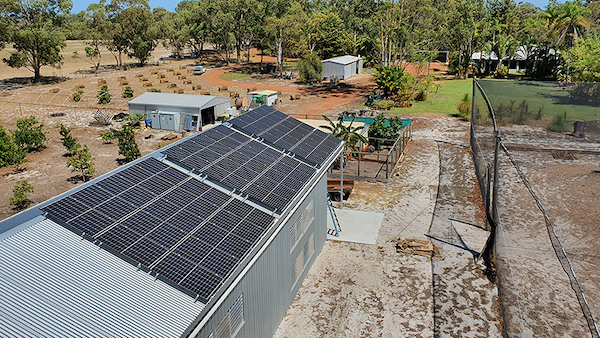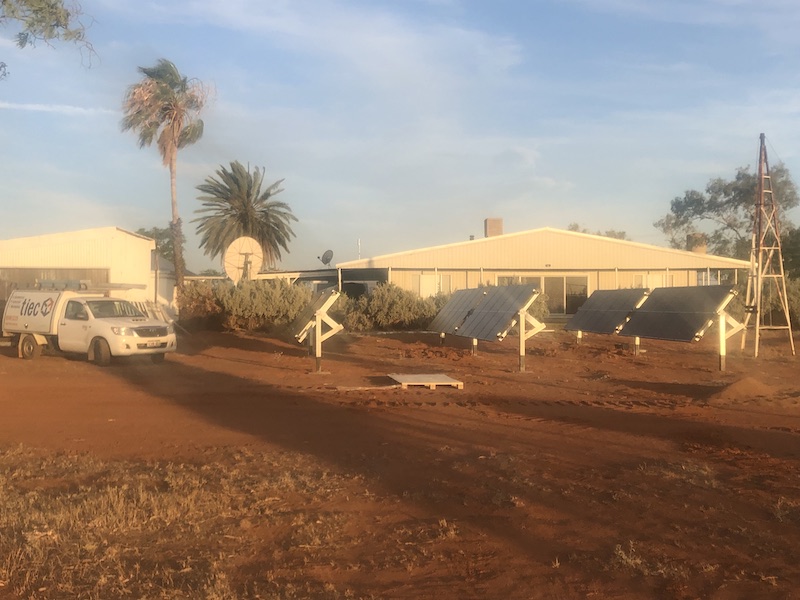Redflow

About Redflow
Redflow Limited, a publicly-listed Australian company (ASX: RFX), produces small 10kWh zinc-bromine flow batteries that tolerate daily hard work in harsh conditions. Redflow batteries are designed for high cycle-rate, long time-base stationary energy storage applications in the telecommunications, commercial & industrial and high-end residential sectors, and are scalable from a single battery installation through to grid-scale deployments. Redflow batteries are sold, installed and maintained by an international network of energy system integrators. Redflow’s smart, self-protecting batteries offer unique advantages including secure remote management, 100 per cent daily depth of discharge, tolerance of high ambient temperatures, a simple recycling path, no propensity for thermal runaway and sustained energy delivery throughout their operating life.
- Details
- In Redflow
- /

After losing power as the night horizon glowed orange with bushfires last summer, WA orchardists Jeff and Kerry Murray installed Redflow batteries to take their property off-grid and make it energy-independent year-round.
Power outages have plagued the Murrays’ farm - called Kalyakool, a Noongah word meaning “forever more” – since they bought the 34-hectare property near Gingin, 90km north of Perth, in 1994.
Mr Murray said the threat from the December bushfire was “the last straw”. “Our water comes from two bores, so without power, we can’t get any water,” he said. “The summer fire didn’t get to us, but it impinged on us through the loss of power for a whole day, which was followed by multiple outages as they brought it back on. If fire does reach us, we need energy to run the pumps to defend our property, which is why the bushfire was the last straw for us.”
- Details
- In Redflow
- /
 Solar panels installed at Yallalong Station in remote WAYallalong Station, a 348,000-hectare cattle property 650km north of Perth, has deployed a Redflow battery-based energy storage system to boost its energy independence and save thousands a year in diesel costs.
Solar panels installed at Yallalong Station in remote WAYallalong Station, a 348,000-hectare cattle property 650km north of Perth, has deployed a Redflow battery-based energy storage system to boost its energy independence and save thousands a year in diesel costs.
The cattle station, in the dry Murchison region northeast of Geraldton, can swelter for months in summer temperatures higher than 40 degrees Celsius - sometimes as high as 48 degrees Celsius.
Yallalong Station owner Lyndon Brown said a 24-hour power supply was essential to attract staff to work at this remote location. “If you want people to live out there in those isolated places, you do need 24-hour power to run all your fridges, air-conditioning and comforts of life that they expect,” he said.
- Details
- In Redflow
- /
 Redflow Limited Managing Director and CEO Tim Harris
Redflow Limited Managing Director and CEO Tim Harris
The New Zealand Rural Connectivity Group (RCG) has chosen Redflow zinc-bromine flow batteries to store energy in off-grid telecommunication sites in remote rural locations. Commercial negotiations to establish a direct relationship between RCG and Redflow to purchase batteries are now underway.
The RCG was established by the New Zealand Government in 2017 as an independent entity to build, operate and maintain a new open access network. The RCG will build over 400 new cell sites in rural locations to extend mobile and wireless broadband coverage to more than 34,000 rural homes and businesses, provide mobile coverage to a further 1000 kilometres of state highways and provide connectivity to more than 100 top New Zealand tourist destinations by December 2022. The new cell sites will be a combination of both off-grid and on-grid locations.
This critical infrastructure project is funded by the government’s Telecommunications Development Levy and an extra $75M from the three mobile network operators, Spark, Vodafone and 2Degrees.
RCG’s off-grid cell sites will meet their energy needs through a combination of PV solar panels, Redflow batteries and a backup generator. It is anticipated that the first site, which will use eight Redflow batteries, will be installed by the end of December 2019.
More News...
- New Redflow partner predicts battery boom as WA solar tariffs end (26 September 2019)
- Redflow receives order for ZBM2 batteries to power rural microgrid in North West Tasmania (29 August 2019)
- Soul Energy partners with Redflow for infrastructure rollouts (21 May 2019)
- Redflow expands into China (17 May 2019)
- Redflow batteries supply energy for remote Thai village (13 February 2019)
- Redflow wins second South African telco battery sale (27 November 2018)
- Redflow batteries to power Optus mobile tower in Daintree rainforest (26 November 2018)
- Redflow batteries to store renewable energy for new children’s centres in Melbourne’s east (23 November 2018)
- Redflow supplies batteries for South African mobile phone towers (22 October 2018)
- Redflow Board gains manufacturing expertise (19 October 2018)
- Redflow recruits energy storage veteran to grow sales (02 October 2018)
- Redflow continues Board Renewal (11 September 2018)
- After turnaround year, Redflow aims for growth (30 August 2018)
- Darling Building beats energy shortfall with Redflow batteries (20 August 2018)
- Redflow batteries to power Fiji’s digital TV rollout (11 July 2018)
- Redflow manufactures complete batteries in Thailand (06 July 2018)
- Redflow cuts $1700 in power costs at holiday house (11 May 2018)
- Redflow raises A$18.1M to grow battery sales (26 April 2018)
- Redflow board pleased by Thai factory progress (29 March 2018)
- Redflow recruits new skills for next phase of growth (27 March 2018)
Off the Cuff

Simon Hackett speaks about Formula E racing on ABC Radio Adelaide
Australian renewable energy investor Simon Hackett last week spoke to Radio ABC Adelaide's Afternoons host Sonya Feldhoff about the benefits for replacing the cancelled Adelaide 500 motor race with a...
Read more
Seven simple steps for mental health in time of coronavirus
After the summer bushfires, the coronavirus pandemic and associated economic shutdown, “unprecedented” must be a standout favourite for Macquarie Dictionary’s Word of the Year for 2020. For the first time...
Read more
John Harris talks (a bit) about International Albinism Awareness Day on ABC Radio
John Harris, who has the honorary role of PR guy for the Albinism Fellowship of Australia, was interviewed by Peter Goers on the Evenings show of ABC Radio Adelaide on...
Read more
Start-ups are key to the future of everything
Nigel Lake, Executive Chair of global business advisory firm Pottinger, will tell this week's Myriad start-ups festival in Brisbane, running May 16-19, that Australia needs start-ups to protect its prosperity. Pottinger...
Read moreContact
Impress Media Australia
P: +61 8 8431 4000
E: john@impress.com.au
W: www.impress.com.au
Street:
Impress Media Australia
313 Portrush Road,
Norwood SA 5067
Click here for our location
Postal:
Impress Media Australia
Box 95, Kensington Park
South Australia 5068
